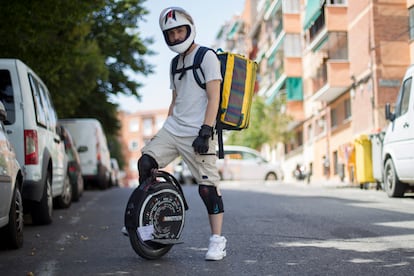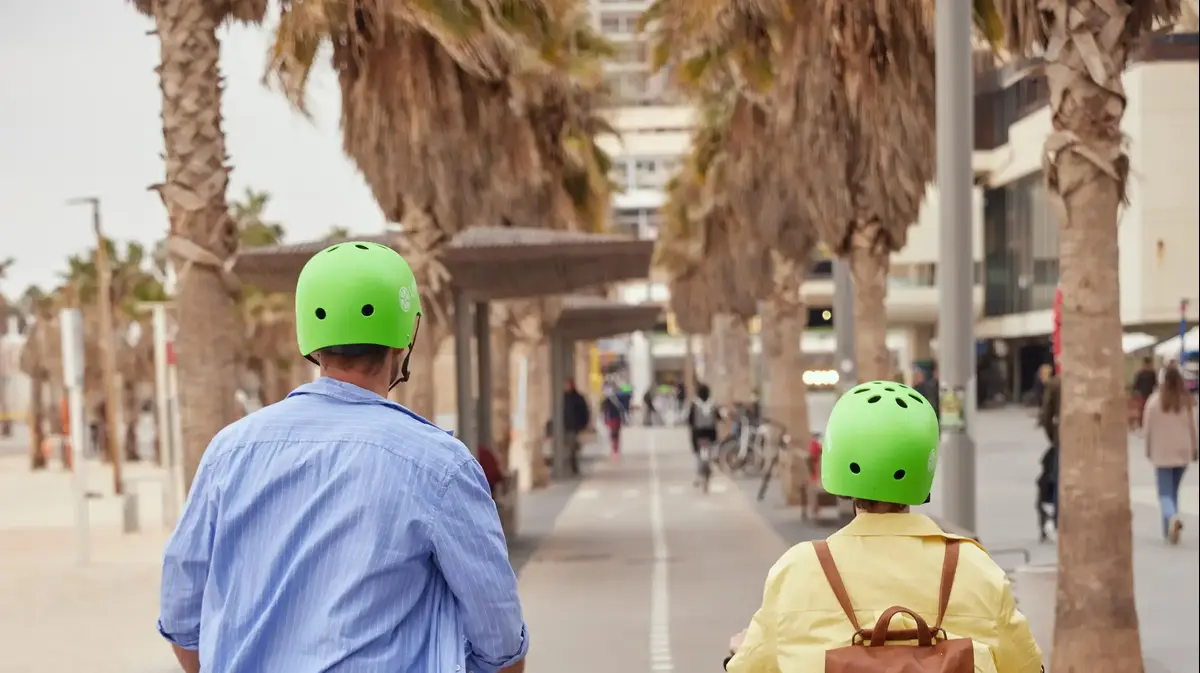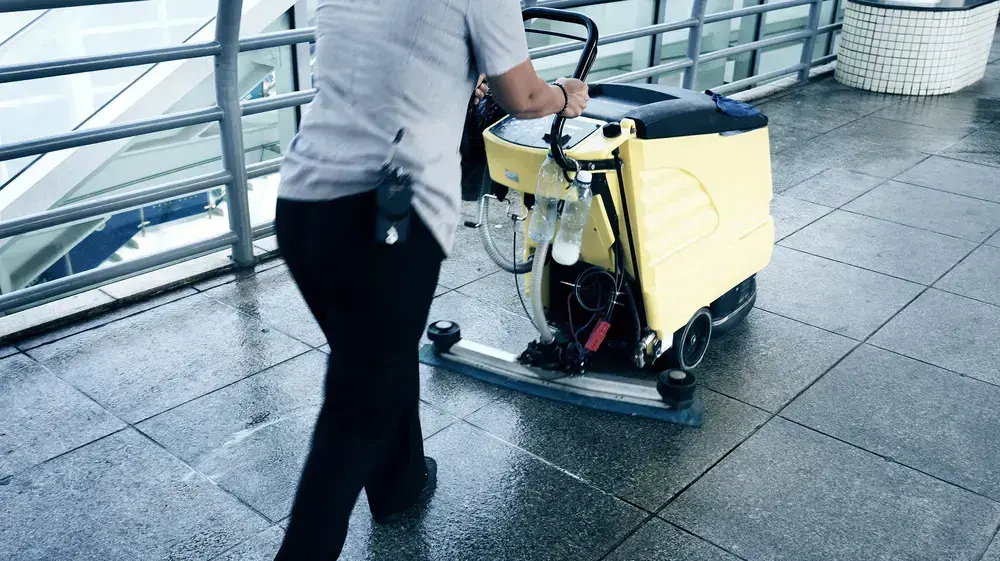Armando Hernández on the electric unicycle in which he delivers through Madrid Santi Burgos
Only a week ago he entered as a deliveryman at Uber Eats, but Armando Hernández has already received an email with his dismissal. "I started a few days ago in Madrid to get an extra this summer, but it didn't last long," says this 27-year-old Venezuelan. He still has his job as a sound engineer, so his life will not change as of Thursday. But he will do it for the dozens of colleagues he has met these days. "The delivery men are very confused, some think that the new law will not be effective, but others assume that they will lose their only job and are very worried."
This uncertainty is explained by the second
delivery
revolution
,
about to begin. If the first changed the way Spaniards consume, the second will transform the business model of the platforms. And everything indicates that it will be a deep metamorphosis. The entry into force of the so-called
riders
law
-
which assumes that the delivery people are salaried and not self-employed - has already left unthinkable headlines just a few months ago: Glovo will ignore the legislation and will only hire part of its fleet, Deliveroo intends to leave Spain in the autumn, Uber Eats will subcontract delivery companies and Just Eat, which never had false self-employed workers, prepares the first collective agreement in the sector for a tenth of its motorists (the rest are employees of restaurants or logistics companies).
More information
The Supreme Court rules that the 'riders' are false self-employed
The 'riders' law is here: what changes does the new rule bring for dealers?
The new regulation, approved in May and which takes effect this Thursday, aims to end the use of self-employed workers in sending food and packages home. For this, it introduces in the Workers' Statute the “presumption of employment” for people who distribute “any consumer product or merchandise” for a company that organizes work “through a digital platform”. This norm raises to the rank of law what the Supreme Court already dictated in September last year, when it declared the
riders
of these platforms
false self-employed
.
Despite the literality of the law, only Just Eat and Glovo will put a percentage of their distributors on the payroll, which has caused a strong malaise in the sector.
"In the end, this only portrays the model of these platforms: outsourcing to the extreme," criticizes Rubén Ranz, in charge of the digital division of the UGT union, who thinks that the new law is the correct one, but reiterates that the platforms do not act well. faith: "They are only interested in breaking the norm and generating a social conflict."
Something similar states a spokesman for the RidersXDerechos distribution platform: “These companies have not respected the Workers' Statute for five years because they live off it.
If the Labor Inspection is not strengthened, the new law will not be applied ”.
Glovo: 2,000 contracts and minor changes
Glovo has announced that it will hire some 2,000
riders
in Spain between now and the end of the year, far from the estimated 12,000
riders
it has in the country. The rest will remain under the current model of autonomous collaboration, although the Spanish firm will change the working conditions of these cyclists to try to skirt the ruling of the Supreme Court and the new regulations.
To justify that its self-employed distributors enjoy independence —and thus avoid hiring— Glovo will allow them to connect to the application at any time they wish (until now they had to reserve work slots), reject orders, and in turn subcontract other
riders
so that deal instead and it will give them some freedom to decide their delivery rates. "After identifying the dependency and alienation notes indicated by the Supreme Court, these are eliminated," the platform's law firm explains in a note, which has refused to answer questions from this newspaper.
However, the labor experts consulted reject this drift and assure that Glovo maintains the main link with its cyclists: the mobile application and its algorithm, which organizes work, connects customers and delivery people and calculates order prices. "The distributors may make small or large variations in their day to day, but the system remains subordinate to Glovo", explains Adrián Todolí, doctor in Labor Law from the University of Valencia, who recalls that this was the bulk of the argument of the courts: “The Supreme Court makes it very clear that it is not relevant whether the worker can choose their schedule or if they can reject orders. What is relevant is who owns the digital tool ”. Along the same lines, Jesús Cruz, professor of Labor Law at the University of Seville, points out,that thinks that the changes of the signature are "a losing battle" and it anticipates the return of the case to the courts. With these arguments, the Workers' Commissions union denounced Glovo to the Labor Inspectorate on Monday.
Disconnection starting Thursday at Uber Eats
Uber Eats, the delivery division of the US giant Uber, has also chosen to keep its motorists outsourced after the law came into force and will use delivery people from logistics companies to fulfill their orders.
Those who until now worked as freelancers will be disconnected this Thursday from the system.
The Uber Eats outsourcing formula was one of the clear alternatives to the use of freelancers and the different delivery companies have been experimenting with it for months. The unions have warned for a long time that this system could incur in an illegal transfer of workers, since the orders are organized by the application of the platform, in this case Uber, which has also refused to answer questions from EL PAÍS. "His work model falls into fraud again," says Ruben Ranz, of UGT, the union that already denounced Glovo, Amazon and Uber Eats in April for subcontracting delivery drivers through logistics companies. Then, Ignasi Beltran, professor of Labor Law at the Open University of Catalonia, assured:"If [he hires] it does not contribute anything because the distributors are organized with the application of the platform and only provide the labor, an illegal transfer would be incurred."
Just Eat negotiates the first collective agreement of the platforms
Despite being the longest running company in the sector - it has been operating in Spain for almost 11 years - Just Eat had never used freelancers to deliver.
Its next “natural step”, according to its director in Spain, Patrik Bergareche, is collective bargaining, which is why it began this summer to negotiate with the unions the first collective agreement for distribution platforms, although there are already similar ones, such as that of Messenger service.
"We have to reconcile the creation of new business models without sacrificing the welfare state," explains the businessman.
The agreement, which is expected in September, will only affect the Just Eat company and its salaried distributors, who account for around 10% of the total number of motorists who dispatch for the company.
Approximately another 10% of the fleet is subcontracted to logistics companies, while the rest are employees of the restaurants themselves, which is why they are governed as agreed with their businesses.
The agreement may not be applied to other competing companies either, although Bergarache aspires to make it "a precedent" in the sector.
"It is not reasonable that in a sector with so much growth we are on the verge of sentencing," he concludes.
Deliveroo's goodbye to Spain
Deliveroo made public its intention to leave Spain two weeks ago, days before the entry into force of the
rider
law
. According to the company, the business model is not profitable in Spain, although it denies that this march has to do with the hiring of delivery men. The reason is that increasing its market share would be an investment that it cannot afford, the company reported at the time.
The platform will consult employees and distributors in September if they accept the closing conditions, although before that they must put their
riders
on the payroll
, since until now they were false self-employed and must become salaried before this Thursday. Deliveroo has already summoned the unions to begin negotiating a collective dismissal over the next month that will affect 3,871 people.









